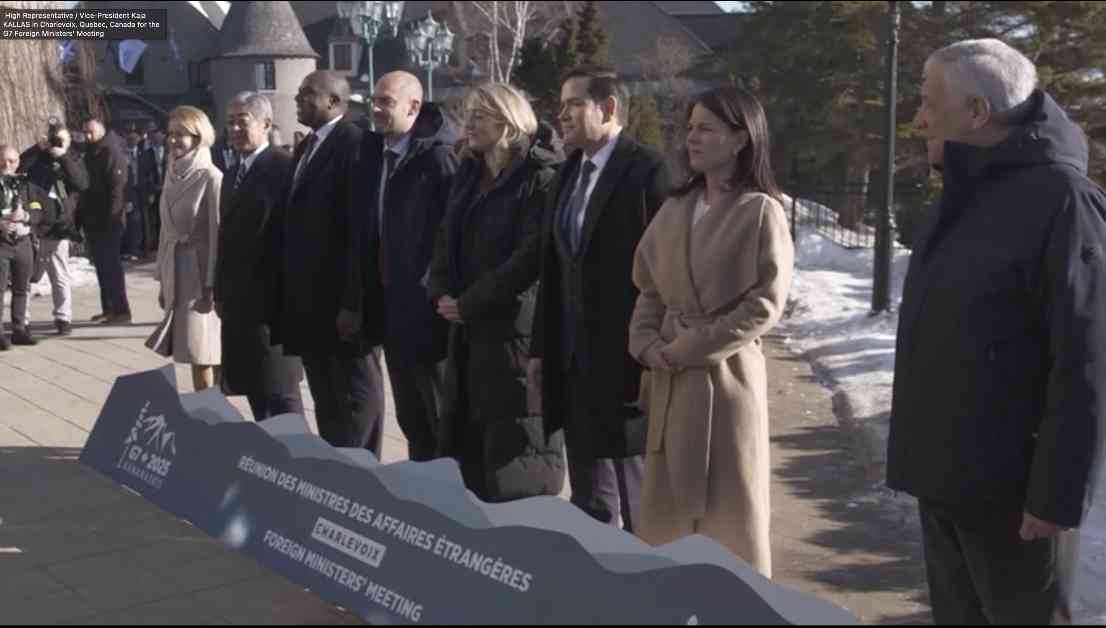Top diplomats from the Group of Seven leading industrial nations convened in Charlevoix, Quebec, on Thursday, hosted by Canada, to address pressing global issues. The main focus of the gathering was to work towards a “just and lasting peace in Ukraine” and enhance security and defense partnerships as the G7 commemorates its 50th anniversary.
Canadian Foreign Minister Melanie Joly set the tone for the discussions with a strong emphasis on peace and stability, highlighting the need to support Ukraine in the face of Russia’s illegal aggression. She stressed the importance of addressing maritime security challenges, pointing out threats like the use of shadow fleets and sabotage of critical undersea infrastructure.
U.S. Secretary of State Marco Rubio expressed optimism about the potential for a ceasefire between Russia and Ukraine in the coming days, pending agreement from the Kremlin. He urged G7 foreign ministers to prioritize efforts to end the ongoing conflict in the region.
Ukraine’s Commitment to Peace
Prior to the G7 talks, Ukraine engaged in discussions with the United States in Jeddah, Saudi Arabia, where they expressed readiness to accept a U.S. proposal for an immediate 30-day ceasefire. Ukrainian President Volodymyr Zelenskyy conveyed his country’s dedication to swiftly moving towards peace and creating the necessary conditions for a sustainable resolution.
In a social media post, Zelenskyy welcomed the U.S. proposal for an air and sea ceasefire, signaling Ukraine’s willingness to extend the ceasefire to land. Russian President Vladimir Putin indicated Russia’s support for the ceasefire proposal in principle, although certain details still needed clarification to move forward.
European Union foreign policy chief Kaja Kallas emphasized the importance of firmness in ceasefire negotiations, cautioning against conditions that could complicate the process. She noted Russia’s significant military expenditure and the corresponding increase in defense investments by European nations as factors influencing the dynamics of the conflict.
Broader Security Concerns and Diplomatic Engagements
In addition to the focus on Ukraine, G7 foreign ministers delved into discussions about China’s global security stance, stability in the Indo-Pacific region, and maritime security in closed-door sessions. The talks aimed to address a range of pressing issues impacting international relations beyond the immediate conflict in Ukraine.
Rubio highlighted the need for effective monitoring mechanisms in the event of a ceasefire, emphasizing the importance of establishing trusted monitors to oversee potential incidents of small arms fire or other exchanges that may occur. This attention to detail underscores the complexity of navigating peace negotiations in a conflict-ridden environment.
The G7 meeting brought together ministers from Britain, Canada, France, Germany, Italy, Japan, and the United States, representing a diverse range of perspectives and priorities in the realm of global diplomacy. The collaborative efforts and strategic dialogues among these nations are crucial in shaping the trajectory of international relations and security dynamics.
As the discussions continue, the world watches closely for signs of progress towards peace and stability in Ukraine, as well as broader implications for global security and cooperation. The outcomes of the G7 talks will undoubtedly have far-reaching effects on the geopolitical landscape, underscoring the critical role of diplomatic engagement in resolving conflicts and fostering a more secure world.
The meeting concluded with a renewed sense of purpose and commitment among the G7 nations to address the complex challenges facing the international community. The road to peace may be fraught with obstacles, but the shared determination of these leading industrial powers offers hope for a brighter and more secure future for all.














